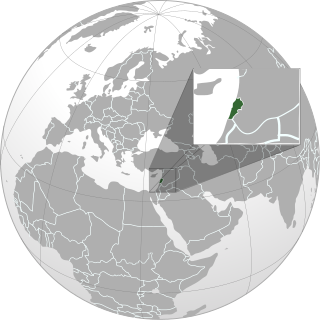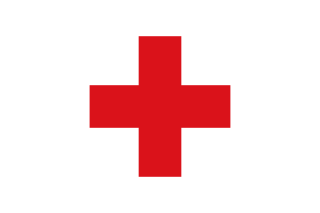
Lebanon, officially the Republic of Lebanon or the Lebanese Republic, is a country in Western Asia. It is located between Syria to the north and east and Israel to the south, while Cyprus lies to its west across the Mediterranean Sea; its location at the crossroads of the Mediterranean Basin and the Arabian hinterland has contributed to its rich history and shaped a cultural identity of religious diversity. It is part of the Levant region of the Middle East. Lebanon is home to roughly five million people and covers an area of 10,452 square kilometres (4,036 sq mi), making it the second smallest country in continental Asia. The official language of the state is Arabic, while French is also formally recognized; Lebanese Arabic is used alongside Modern Standard Arabic throughout the country.

The Lebanese Armed Forces (LAF), also known as the Lebanese Army, is the military of the Lebanese Republic. It consists of three branches, the ground forces, the air force, and the navy. The motto of the Lebanese Armed Forces is "Honor, Sacrifice, Loyalty".

The American University of Beirut (AUB) is a private, non-sectarian, and independent university chartered in New York with its campus in Beirut, Lebanon. AUB is governed by a private, autonomous board of trustees and offers programs leading to bachelor's, master's, MD, and PhD degrees.

The Syrian Social Nationalist Party (SSNP) is a Syrian nationalist party operating in Syria, Lebanon, Jordan, and Palestine. It advocates the establishment of a Greater Syrian nation state spanning the Fertile Crescent, including present-day Syria, Lebanon, Iraq, Kuwait, Jordan, Palestine, Cyprus, Sinai, Hatay Province, and Cilicia, based on geographical boundaries and the common history people within the boundaries share. It has also been active in the Syrian and Lebanese diaspora, for example in South America with over 100,000 members as of 2016, it is the second-largest legal political group in Syria after the ruling Arab Socialist Ba'ath Party.

The Lebanese Communist Party (LCP) is a communist party in Lebanon. It was founded in 1924 by the Lebanese intellectual, writer and reporter Yusuf Yazbek and Fu'ad al-Shamali, a tobacco worker from Bikfaya.

An-Nahar is a leading Arabic-language daily newspaper published in Lebanon. In the 1980s, An-Nahar was described by the New York Times and Time Magazine as the newspaper of record for the entire Arab world.

The Democratic Left Movement is a nonsectarian and a democratic leftist political party. It was founded in September 2004 by left-wing and center-left intellectuals and activists some of whom had previously split from the Lebanese Communist Party (LCP) while some were student activists from the "Independent Leftist Groups". The DLM affirms a European-style social democracy—but is open to all forms of leftism and encourages the development of a true secular state. The party operates under a decentralized framework that emphasizes diversity of thought for a progressive society in a liberal democratic environment. It participated in the 2005 Cedar Revolution, a wave of demonstrations against the Syrian occupation of Lebanon, and calls for correcting imbalanced relations with Syria.
Human rights in Lebanon refers to the state of human rights in Lebanon, which were considered to be on par with global standards in 2004. Some believed to be criminals and terrorists are said to be detained without charge for both short and long periods of time. Freedom of speech and of the press are ensured to the citizens by the Lebanese laws which protect the freedom of each citizen. Palestinians living in Lebanon are heavily deprived of basic civil rights. They cannot own homes or land, and are barred from becoming lawyers, engineers and doctors. However the Lebanese government has reduced the number of restricted jobs and created a national dialogue committee for the issue. During the Arab Spring, Lebanon experienced major protests and sectarian violence, but avoided the large-scale political upheaval seen in many parts of the Arab world.

The history of the Jews in Lebanon encompasses the presence of Jews in present-day Lebanon stretching back to biblical times. Following large-scale emigration following the 1948 Arab–Israeli War, and much more importantly the Lebanese Civil War, the vast majority of Lebanese Jews now live in Western countries and many live in Israel. As the latest census in Lebanon was conducted in 1932, there are virtually no statistics available. In 2006, there were about 40 Jews in Lebanon, whereas in 2020 there were only about 29 Jews in Lebanon. Reports indicate that in 2022 the number of Jews in Lebanon was 27 to 20.

The Lebanese Red Cross (LRC) is a humanitarian organization and an auxiliary team to the medical service of the Lebanese Army. Its headquarters is in the Lebanese capital city of Beirut. Founded in 1945, the organization comprises a number of approximately 7,000 members/volunteers and 200 staff personnel. The society works with the International Federation and the ICRC, and on a bilateral basis with the Norwegian and the French Red Cross. The LRC also works with the relevant components of the Lebanese authorities, with UN agencies and NGOs.

Lebanon is an eastern Mediterranean country that has the most religiously diverse society within the Middle East, comprising 18 recognized religious sects. The primary religions are Islam and Christianity. The Druze concern around an estimate of 5% of the citizens in Lebanon. Furthermore outside of Lebanon, Lebanese people are mostly Christians. It is also estimated that a large proportion of its population are refugees, which affects statistics. The refugees, who mostly are of Syrian or Palestinian origin, are predominantly Sunni Muslim, hence also include Christians and Shia Muslims.

Qartaba is a town in the mountains of the Byblos District of the Keserwan-Jbeil Governorate, Lebanon. It is located 57 kilometers north Beirut on the mountains above Byblos at an average altitude of 1,250 meters. Qartaba is surrounded by olive groves, apple orchards, and vineyards.
Benjamin C. Wedeman is an American journalist and war correspondent. He is a CNN senior international correspondent based in Rome. He has been with the network since 1994, and has earned multiple Emmy Awards and Edward Murrow Awards for team reporting.
The Malcolm H. Kerr Carnegie Middle East Center, previously known as The Carnegie Middle East Center (CMEC) is a think tank and research center dealing with public policy in the Middle East. It was established in Beirut, Lebanon in November 2006 by the Carnegie Endowment for International Peace
Palestinians in Lebanon include the Palestinian refugees who fled to Lebanon during the 1948 Palestine War, their descendants, the Palestinian militias which resided in Lebanon in the 1970s and 1980s, and Palestinian nationals who moved to Lebanon from countries experiencing conflict, such as Syria. There are roughly 3,000 registered Palestinians and their descendants who hold no identification cards, including refugees of the 1967 Naksa. Many Palestinians in Lebanon are refugees and their descendants, who have been barred from naturalisation, retaining stateless refugee status. However, some Palestinians, mostly Christian women, have received Lebanese citizenship, in some cases through marriage with Lebanese nationals.
Takfir wal-Hijra, was the popular name given to a radical Islamist group Jama'at al-Muslimin founded by Shukri Mustafa which emerged in Egypt in the 1960s as an offshoot of the Muslim Brotherhood. Although the group was crushed by Egyptian security forces after it murdered an Islamic scholar and former government minister in 1977, it is said to have "left an enduring legacy" taken up by some Islamist radicals in "subsequent years and decades."
Middle Eastern Americans are Americans of Middle Eastern background. According to the United States Census Bureau, the term "Middle Eastern American" applies to anyone of West Asian or North African origin. This includes people whose background is from the various Middle Eastern and West Asian ethnic groups, such as the Kurds and Assyrians, as well as immigrants from modern-day countries of the Arab world, Iran, Israel, Turkey, and sometimes Armenia.

Amal Clooney is a Lebanese and British barrister. Her clients include Filipino and American journalist Maria Ressa; former President of the Maldives Mohamed Nasheed; Julian Assange, the founder of WikiLeaks; former Prime Minister of Ukraine Yulia Tymoshenko; Egyptian-born Canadian journalist Mohamed Fahmy; and Iraqi activist Nadia Murad.
The Boston Women's Heritage Trail is a series of walking tours in Boston, Massachusetts, leading past sites important to Boston women's history. The tours wind through several neighborhoods, including the Back Bay and Beacon Hill, commemorating women such as Abigail Adams, Amelia Earhart, and Phillis Wheatley. The guidebook includes seven walks and introduces more than 200 Boston women.











